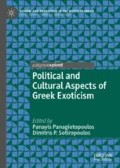Abstract
The outbreak of the Greek crisis generated interest among its neighbouring states. Turkish views were among the most striking, as they were informed by long-standing stereotypes and domestic politics. Two main narratives emerged. The first pointed at Greece as the “spoiled child of the West”. The dire state of the Greek state and economy was then juxtaposed with what was presented as a “Turkish success story”, underwritten by the policies of the AKP administration. In the second view, Greece appeared as a bastion of the global left resistance movement and Greeks as anti-capitalist pioneers, fighting against neoliberalism and globalization. The indignados movement, the refusal to abide by the demands of the creditors and the 5 July 2015 referendum all attracted considerable interest and offered insights into Turkish politics.
Access this chapter
Tax calculation will be finalised at checkout
Purchases are for personal use only
Notes
- 1.
No Western language for example offers the distinction between Rum and Yunan, which is crucial for the understanding of modern Greek identity (Benlisoy and Benlisoy 2001).
- 2.
For example, the role of Ottoman Greek bureaucrats in the Tanzimat (reform) era is generally neglected in both Greece and Turkey, as it does not befit nationalist stereotypes on both sides.
- 3.
On stereotypes and their function in Greek-Turkish relations (Theodossopoulos 2003).
- 4.
- 5.
Religious and cultural differences between Orthodox, Catholic and Protestant Christians, which have gained such a high resonance in Greek anti-Western discourses, remained unnoticed in such debates. On the role of perceptions in Greek-Turkish conflict (Heraclides 2010).
- 6.
For a study of how the Greek War of Independence influenced the Ottoman state and society (Ilicak 2011).
- 7.
On the role of religious identity in the formation of Greek and Turkish national identities (Grigoriadis 2013).
- 8.
This line of argument is famously represented in the words “May the Culprits be Cursed” (Anathema stous Aitious-Kahrolsun sebeb olanlar) of Dido Sotiriou’s classic novel “Farewell Anatolia.” The bloody Greek-Turkish war which brought an end to the centuries-old coexistence of Greeks and Turks in Anatolia was not blamed on nationalism, the peoples or the political elites of both countries. It was rather put on the shoulders of the Western powers, which stoked the Greek-Turkish conflict so they could further their imperialist interests. On the effect of the 30 January 1923 mandatory population exchange (Hirschon 2003).
- 9.
The ability of the Greek left to establish a winning social alliance and appeal to the Greek middle and labour classes may be also linked to the divergent conditions under which Greek and Turkish political economy evolved over the years (Onis and Grigoriadis 2010).
References
Benlisoy, F., & Benlisoy, S. (2001). Millet-i Rum’dan Helen ulusuna. In M. Ö. Alkan (Ed.), Cumhuriyet’e devreden düşünce mirası: Tanzimat ve Meşrutiyet’in birikimi (pp. 367–376). İstanbul: İletişım.
Clogg, R. (1992). A Concise History of Greece. Cambridge: Cambridge University Press.
Gözaydın, İ. (2009). Diyanet: Türkiye Cumhuriyeti’nde Dinin Tanzimi. İstanbul: İletişim.
Grigoriadis, I. N. (2011). Greek Tragedy. World Policy Journal, 28(2), 101–109. https://doi.org/10.1177/0740277511411665.
Grigoriadis, I. N. (2013). Instilling Religion in Greek and Turkish Nationalism: A “Sacred Synthesis”. New York: Palgrave Macmillan.
Heraclides, A. (2010). The Greek-Turkish Conflict in the Aegean: Imagined Enemies. Basingstoke: Palgrave Macmillan.
Hirschon, R. (2003). ‘Unmixing Peoples’ in the Aegean Region. In R. Hirschon (Ed.), Crossing the Aegean: An Appraisal of the 1923 Population Exchange Between Greece and Turkey (pp. 3–12). New York; Oxford: Berghahn Books.
Ilicak, H. S. (2011). A Radical Rethinking of Empire: Ottoman State and Society During the Greek War of Independence (1821–1826) (PhD dissertation). Harvard University, Massachusetts.
İstanbul Office. (2015). İstanbul’da Yunanistan ile dayanışma eylemi: ‘Diren Syriza, İstanbul seninle’ [Solidarity to Greece Demonstration in Istanbul: Resist SYRIZA, Istanbul Is with You]. İstanbul: DemokratHaber. https://www.demokrathaber.org/siyaset/istanbul-da-yunanistan-ile-dayanisma-eylemi-diren-syriza-istanbul-seninle-h51200.html
İstanbul Office. (2018). Erdoğan’dan Moody’s’e sert tepki! [Fierce Reaction from Erdoğan against Moody’s]. Sabah, March 9. İstanbul. https://www.sabah.com.tr/ekonomi/2018/03/09/erdogandan-moodyse-sert-tepki.
Karamouzi, E. (2014). Greece, the EEC and the Cold War 1974–1979: The Second Enlargement. Basingstoke: Palgrave Macmillan.
Koliopoulos, J. S., & Veremis, T. M. (2010). Modern Greece: A History Since 1821. Chichester: Wiley-Blackwell.
Millas, H. (1991). History Textbooks in Greece and Turkey. History Workshop, 31, 21–33.
Millas, H. (2002). Milli Türk Kimliği ve ‘Öteki’ (Yunan). Modern Türkiye’de Siyasi Düşünce, 4, 193–201.
Millas, I. (2006). Tourkokratia: History and the Image of Turks in Greek Literature. South European Society and Politics, 11(1), 47–60. https://doi.org/10.1080/13608740500470315.
Onis, Z., & Grigoriadis, I. N. (2010). Europe and the Impasse of Centre-left Politics in Turkey: Lessons from the Greek Experience. Journal of Balkan and Near Eastern Studies, 12(3), 259–274. https://doi.org/10.1080/19448953.2010.506823.
Özsüer, E. (2015). Tarihin “Öteki” Yüzü: Türkiye ve Yunanistan Örneğinde Tarihi Yeniden Algılamak. Turkish History Education Journal, 4(2), 165–201.
Stelya, N. (2018). Yunanistan’da laiklik ilk kez anayasaya giriyor [Secularism Enters the Constitution for the First Time in Greece]. İstanbul: Gazete Duvar. https://www.gazeteduvar.com.tr/dunya/2018/10/24/yunanistanda-laiklik-ilk-kez-anayasaya-giriyor/.
Theodossopoulos, D. (2003). Degrading Others and Honouring Ourselves: Ethnic Stereotypes as Categories and as Explanations. Journal of Mediterranean Studies, 13(2), 177–188.
Author information
Authors and Affiliations
Corresponding author
Editor information
Editors and Affiliations
Rights and permissions
Copyright information
© 2020 The Author(s)
About this chapter
Cite this chapter
Grigoriadis, I.N. (2020). “Spoiled Brats” or “Anti-capitalist Pioneers”. Turkish Views of the Greek Crisis. In: Panagiotopoulos, P., Sotiropoulos, D. (eds) Political and Cultural Aspects of Greek Exoticism. Reform and Transition in the Mediterranean. Palgrave Pivot, Cham. https://doi.org/10.1007/978-3-030-19864-0_8
Download citation
DOI: https://doi.org/10.1007/978-3-030-19864-0_8
Published:
Publisher Name: Palgrave Pivot, Cham
Print ISBN: 978-3-030-19863-3
Online ISBN: 978-3-030-19864-0
eBook Packages: Political Science and International StudiesPolitical Science and International Studies (R0)

